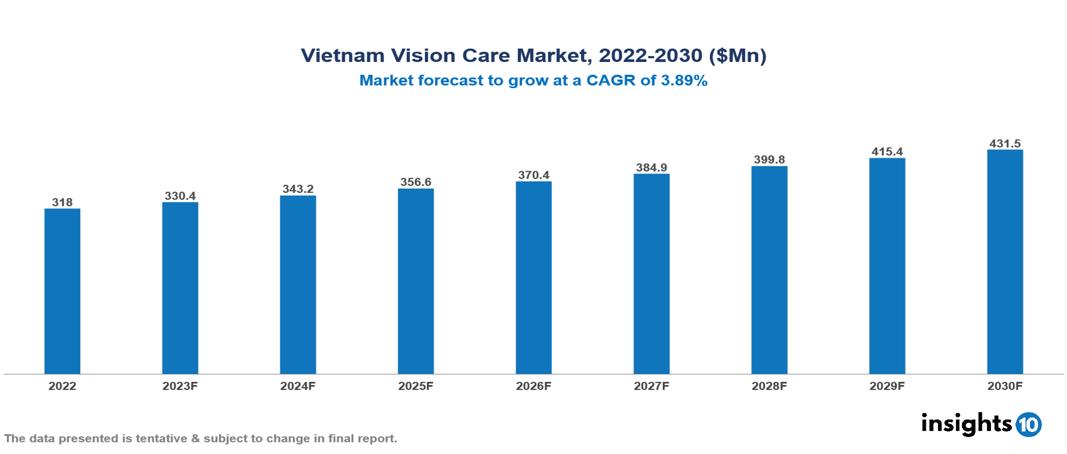Vietnam Vision Care Market Analysis
Vietnam Vision Care Market is projected to grow from $xx Mn in 2022 to $xx Mn by 2030, registering a CAGR of xx% during the forecast period of 2022 - 2030. Vision Care market is growing globally due to the increasing prevalence of eye disorders such as myopia, hyperopia, astigmatism, and age-related macular degeneration (AMD), surging volume of patients suffering from chronic diseases which will led to the occurrences of vision ailments, improper intake of nutrition and unhealthy food eating habits, technological advancements in vision care industry like innovations in lens materials, frame designs, and contact lens technologies, increasing awareness about the importance of regular eye exams and eye health initiatives by governments, healthcare organizations and growth of the e-commerce sector. EssilorLuxottica, Johnson & Johnson, Novartis AG (Alcon), CooperVision, Bausch Health Companies (Bausch + Lomb), Zeiss, Hoya Corporation, Safilo Group and Carl Zeiss Meditec are the key global market players.
Buy Now


Vietnam Vision Care Market Analysis Summary
Vietnam Vision Care Market is valued at around $318 Mn in 2022 and is projected to reach $431.5 Mn by 2030, exhibiting a CAGR of 3.89% during the forecast period 2023-2030.
The vision care market includes everything relating to vision improvement, eye care, and general eye health. This market is divided into several segments, including those for eyewear, contacts, ophthalmic drugs, and vision care services. Cataracts, glaucoma, conjunctivitis, and retinal detachment are some of the vision-related ailments and defects for which there has been a significant increase in the number of cases. Eyewear encompasses goods and accessories worn over or on the eyes for a variety of purposes, such as fashion, environmental protection, or to help people with vision impairment. The eyewear industry includes spectacles, sunglasses, and contact lenses. The category of spectacles is further broken down into eyewear glasses and eyewear frames. To restore the focusing ability of a natural lens that has been surgically removed, most frequently as part of cataract surgery, an intraocular lens implant is a synthetic, artificial lens that is put inside the eye. Intraocular lenses (IOLs), like silicone oil intraocular lenses, are constructed of silicone, acrylic, or other plastic materials and coated with a specific substance to help shield the eyes from the sun's harmful ultraviolet (UV) radiation. Intraocular lenses can now be implanted in adults over the age of eighteen, according to the FDA. Contact lens solution is used to clean, sanitize, and store contacts, use contact lens solution. Other liquids, such as saline, daily cleaners, and enzymatic protein removers, among others, are used for particular applications like cleaning and disinfection in addition to the widely used multifunctional and hydrogen peroxide-based solution. Contact lens solution is necessary to maintain the lubrication of the lenses and eyes. EssilorLuxottica, Johnson & Johnson, Novartis AG (Alcon), CooperVision, Bausch Health Companies (Bausch + Lomb), Zeiss, Hoya Corporation, Safilo Group and Carl Zeiss Meditec are the key global market players.
Market Dynamics
Market Growth Drivers
Increasing prevalence of eye disorders such as myopia, hyperopia, astigmatism, and age-related macular degeneration (AMD), surging volume of patients suffering from chronic diseases which will lead to the occurrences of vision ailments, improper intake of nutrition and unhealthy food eating habits, technological advancements in vision care industry like innovations in lens materials, frame designs, and contact lens technologies, increasing awareness about the importance of regular eye exams and eye health initiatives by governments, healthcare organizations and growth of the e-commerce sector act as market growth drivers.
Market Restraints
Affordability and accessibility of vision care products, lack of awareness and education about the importance of eye exams, Cultural and social factors like wearing eyeglasses may be considered stigmatized, and technological barriers act as market growth restraints.
Competitive Landscape
Key Player
- EssilorLuxottica
- Johnson & Johnson
- Novartis AG (Alcon)
- CooperVision
- Bausch Health Companies (Bausch + Lomb)
- Zeiss
- Hoya Corporation
- Safilo Group
- Carl Zeiss Meditec
1. Executive Summary
1.1 Disease Overview
1.2 Global Scenario
1.3 Country Overview
1.4 Healthcare Scenario in Country
1.5 Patient Journey
1.6 Health Insurance Coverage in Country
1.7 Active Pharmaceutical Ingredient (API)
1.8 Recent Developments in the Country
2. Market Size and Forecasting
2.1 Epidemiology of Disease
2.2 Market Size (With Excel & Methodology)
2.3 Market Segmentation (Check all Segments in Segmentation Section)
3. Market Dynamics
3.1 Market Drivers
3.2 Market Restraints
4. Competitive Landscape
4.1 Major Market Share
4.2 Key Company Profile (Check all Companies in the Summary Section)
4.2.1 Company
4.2.1.1 Overview
4.2.1.2 Product Applications and Services
4.2.1.3 Recent Developments
4.2.1.4 Partnerships Ecosystem
4.2.1.5 Financials (Based on Availability)
5. Reimbursement Scenario
5.1 Reimbursement Regulation
5.2 Reimbursement Process for Diagnosis
5.3 Reimbursement Process for Treatment
6. Methodology and Scope
Market Segmentations For Vietnam Vision Care Market
By Product Type
- Eye Glasses
- Contact Lens
- Intraocular Lens
- Others
By Type
- Rx (Prescription)
- Non-Rx (Non-Prescription)
By Indication
- Refractive Error
- Glaucoma
- Diabetic Retinopathy
- Amblyopia
- Dry Eyes
- Others
By Treatment
- Surgery
- Laser Therapy
- Medication
- Others
By End-User
- Eye Hospitals and Clinics
- Ambulatory Surgery Center
- Optical Stores
- Others
By Distribution Channel
- Retail Stores
- E-Commerce
- Others
Methodology for Database Creation
Our database offers a comprehensive list of healthcare centers, meticulously curated to provide detailed information on a wide range of specialties and services. It includes top-tier hospitals, clinics, and diagnostic facilities across 30 countries and 24 specialties, ensuring users can find the healthcare services they need.
Additionally, we provide a comprehensive list of Key Opinion Leaders (KOLs) based on your requirements. Our curated list captures various crucial aspects of the KOLs, offering more than just general information. Whether you're looking to boost brand awareness, drive engagement, or launch a new product, our extensive list of KOLs ensures you have the right experts by your side. Covering 30 countries and 36 specialties, our database guarantees access to the best KOLs in the healthcare industry, supporting strategic decisions and enhancing your initiatives.
How Do We Get It?
Our database is created and maintained through a combination of secondary and primary research methodologies.
1. Secondary Research
With many years of experience in the healthcare field, we have our own rich proprietary data from various past projects. This historical data serves as the foundation for our database. Our continuous process of gathering data involves:
- Analyzing historical proprietary data collected from multiple projects.
- Regularly updating our existing data sets with new findings and trends.
- Ensuring data consistency and accuracy through rigorous validation processes.
With extensive experience in the field, we have developed a proprietary GenAI-based technology that is uniquely tailored to our organization. This advanced technology enables us to scan a wide array of relevant information sources across the internet. Our data-gathering process includes:
- Searching through academic conferences, published research, citations, and social media platforms
- Collecting and compiling diverse data to build a comprehensive and detailed database
- Continuously updating our database with new information to ensure its relevance and accuracy
2. Primary Research
To complement and validate our secondary data, we engage in primary research through local tie-ups and partnerships. This process involves:
- Collaborating with local healthcare providers, hospitals, and clinics to gather real-time data.
- Conducting surveys, interviews, and field studies to collect fresh data directly from the source.
- Continuously refreshing our database to ensure that the information remains current and reliable.
- Validating secondary data through cross-referencing with primary data to ensure accuracy and relevance.
Combining Secondary and Primary Research
By integrating both secondary and primary research methodologies, we ensure that our database is comprehensive, accurate, and up-to-date. The combined process involves:
- Merging historical data from secondary research with real-time data from primary research.
- Conducting thorough data validation and cleansing to remove inconsistencies and errors.
- Organizing data into a structured format that is easily accessible and usable for various applications.
- Continuously monitoring and updating the database to reflect the latest developments and trends in the healthcare field.
Through this meticulous process, we create a final database tailored to each region and domain within the healthcare industry. This approach ensures that our clients receive reliable and relevant data, empowering them to make informed decisions and drive innovation in their respective fields.
To request a free sample copy of this report, please complete the form below.
We value your inquiry and offer free customization with every report to fulfil your exact research needs.







































